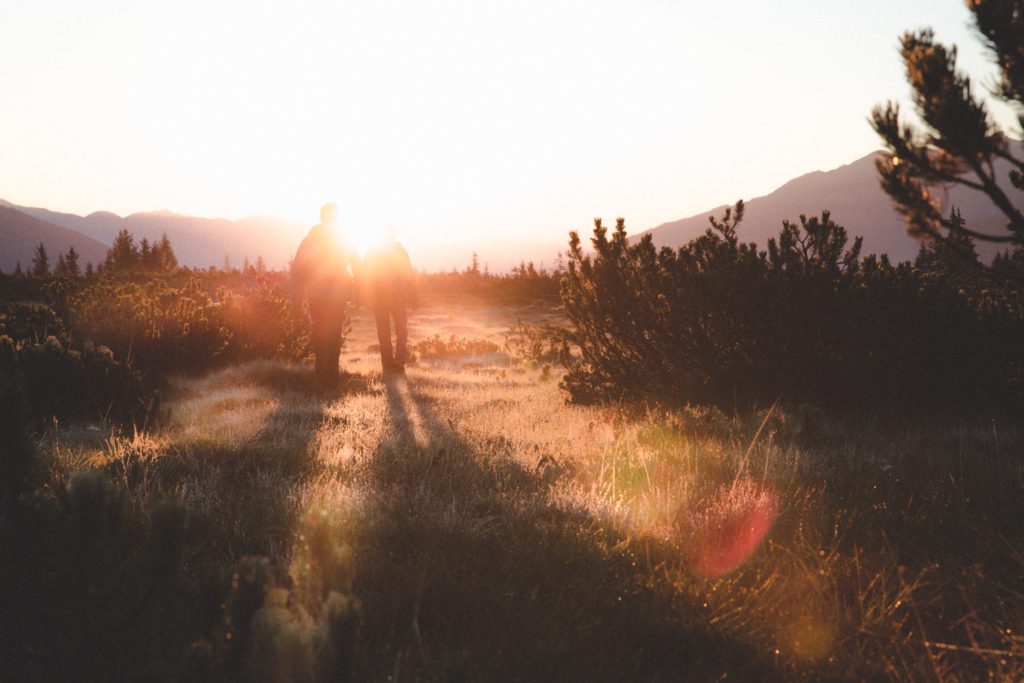It’s a weird time to be Jewish and to celebrate Hanukkah, which commemorates a military victory. I’m still lighting the candles with my friends and family but the whole thing has me contemplating many things: how to be in the world, what I think, why it matters, and who is listening.
If I listen to people in the digital world, everything seems terrible. I don’t only mean the active wars. People are saying spiteful things during presidential debates. They’re presenting polarizing views and shooting for the lowest common denominator rather than higher ideals. If I only focus on the digital world, I get depressed. But in the physical world, things aren’t so bad depending on where you live.
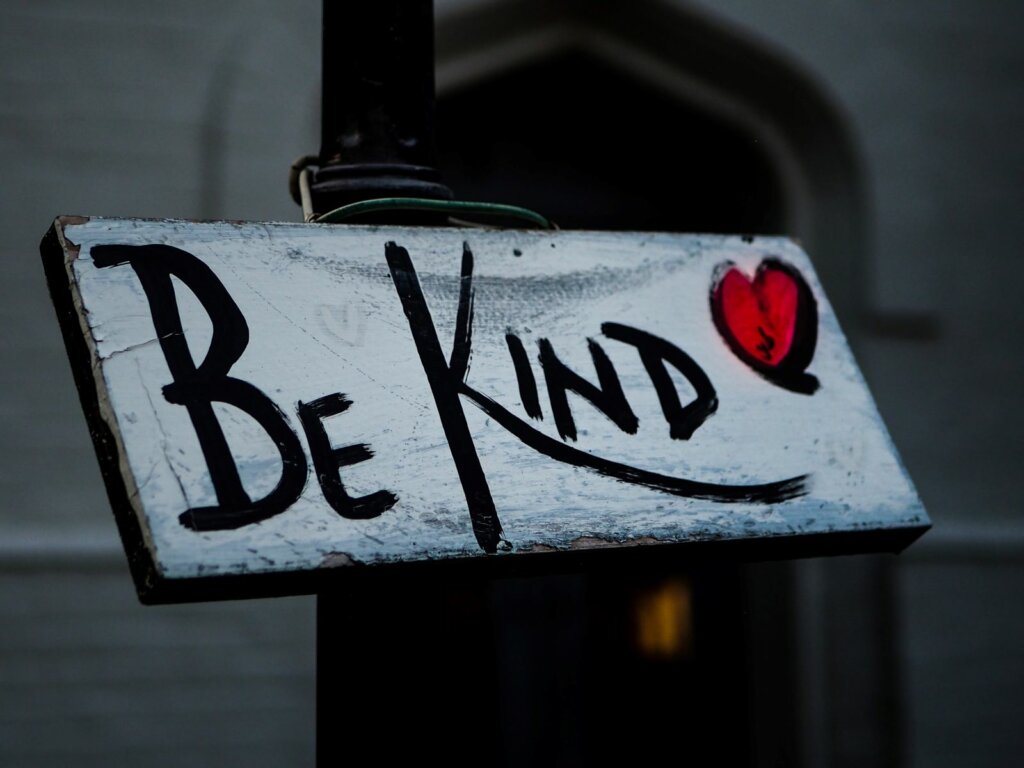
The sign says it all. Photo by Adam Nemeroff on Unsplash
In the physical world, people say, “Hey, is that your umbrella?” when they notice one left behind on a train seat. In the physical world, strangers smile at each other. In the physical world, good Samaritans help elderly ladies carry their walkers up bus steps. It reminds me of a poem by Danusha Laméris called “Small Kindnesses” that I’m quoting a portion of:
I’ve been thinking about the way, when you walk
down a crowded aisle, people pull in their legs
to let you by. Or how strangers still say “bless you”
when someone sneezes, a leftover
from the Bubonic plague. “Don’t die,” we are saying.
And sometimes, when you spill lemons
from your grocery bag, someone else will help you
pick them up. Mostly, we don’t want to harm each other.
We want to be handed our cup of coffee hot,
and to say thank you to the person handing it. To smile
at them and for them to smile back. For the waitress
to call us honey when she sets down the bowl of clam chowder,
and for the driver in the red pick-up truck to let us pass.
That’s my experience of the physical world. That mostly we don’t want to harm each other. That usually we see one another as human beings and say, “Here, let me make things a little easier for you.” It’s that genuine care and love for humanity that solves problems great and small, according to my spiritual teacher.
“This love will give people guidance; it will show them what to do and what not to do,” he said. “It is not necessary to study great numbers of books or to rely upon those who speculate with the future of the silent masses. The only essential requirement is to look upon humanity with genuine sympathy.”
That’s what I’m doing. Day by day, week after week, month after month, year after year, I’m looking upon humanity with genuine sympathy and love hoping that one day, it will all add up. That my small actions and someone else’s small actions will turn into something bigger and greater so that when people are out in the world, they’ll say to themselves, “Things aren’t so bad.”
I dream of a world where we recognize there can be a difference between what people say and how they treat each other. A world where we remember that people may be mean and spiteful on the internet, but in the physical world, they hold open doors for one another and say “bless you,” when someone sneezes. A world where we understand the only way to solve our problems great and small is by starting from a place of love and kindness.
Another world is not only possible, it’s probable.
My dad told me about a TV show where people try to be the last person to survive in the woods on their own for a chance at winning $500,000. The premise is interesting because it touches on the themes of competition, human versus nature, and also resourcefulness. I get the appeal. But what I don’t get is the lengths people will go to in order to win.
One contestant swam into a frozen lake in an attempt to catch some fish knowing she’d get hypothermia. She explicitly told the camera she knew that would happen. The woman could have tapped out of the show at any time and said, “You know what? The $500,000 isn’t worth it. Take me to the grocery store,” but she didn’t. She literally risked her life all for what? Money. Money that frankly won’t last very long considering the rate of inflation.
Desperation is real and it pushes people to do things they otherwise wouldn’t. But this woman wasn’t a member of the Donner party, starving to death in the middle of winter. She was in a situation of contrived and self-inflicted desperation. I don’t fault this woman; I don’t know her or her story. She made her choice freely. No, instead what I fault is the toxic worldview pervading our society that lauds this sort of decision: materialism.
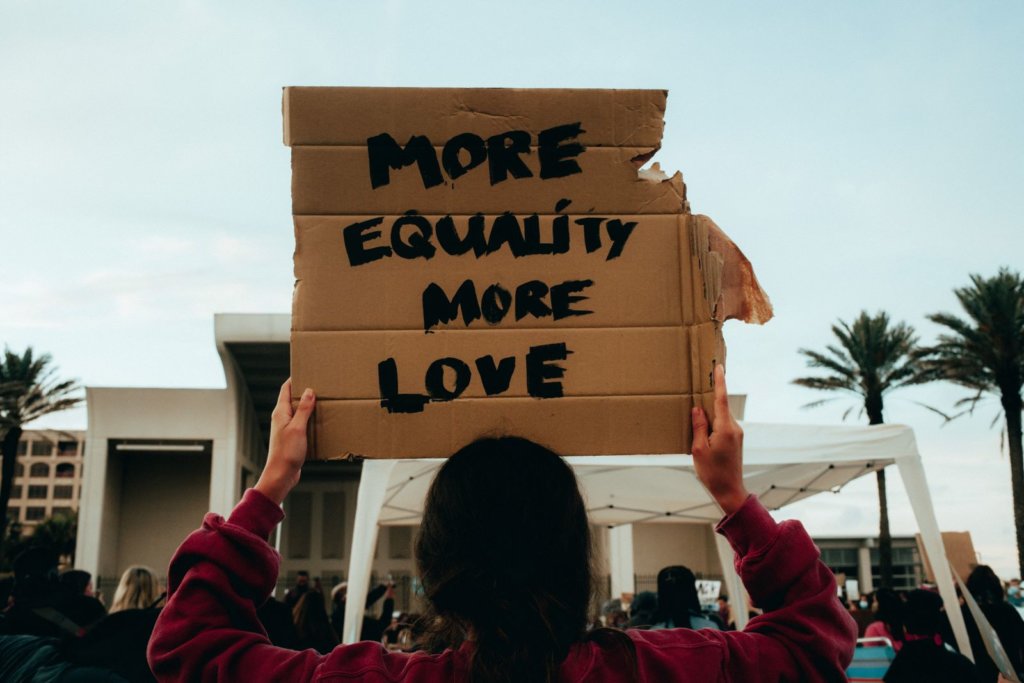
I agree! More equality, more love! Photo by Cody Pulliam on Unsplash
My favorite summary of materialism comes from a friend who says, “Under materialism, only matter matters.” Exactly. In a materialistic society, money and possessions are more important than love, community, and life. Not everyone is willing to become hypothermic for cash, but over and over again, we demonstrate human life isn’t worth more than money in indirect ways: child labor, exploitative working conditions, polluting the environment, etc. We are poisoning and killing one another for something ephemeral.
I’m not here to say money is unimportant because that’s a lie. It is important, but it’s not the only thing that matters. The worldview I use stems from tantra and my friend sums it up by saying, “Under tantra, everything matters.” What he means is matter matters. People matter. The environment matters. Spirituality matters. Under tantra, you take it all into account. Money is not the bottom line every time.
We take it for granted that materialism is the only way to operate in the world but it’s not. It’s a belief system and belief systems can change. A little religious inspiration for you that’s appropriate considering this time of year: Hanukkah isn’t really a story about oil lasting for eight days. It’s the celebration of people unifying against oppression and winning.
A quick recap: Judah and the Maccabees revolted against Syrian King Antiochus in 160 BCE. He enacted a series of harsh decrees against the Jews, including forcing them to give so much of their crops to the Syrian ruling class, the Jews had trouble feeding their families. Jewish worship was forbidden; scrolls were confiscated and burned. Sabbath and dietary laws were prohibited under the penalty of death. This small group of Jewish rebels fought against an army of thousands of men and won.
My rabbi, Michael Lerner, says, “Hanukkah is not just about having a response to the consumption craze around Christmas, it is about affirming a different worldview, a hopeful worldview. [It’s] about replacing cultures of domination with a culture of love and justice.”
We already have examples of worldviews toppling. We know it can be done because it’s been done before. We don’t need to keep operating as if materialism is the only game in town because it’s not. There’s another way to live, a better way. One in which we recognize the importance of bodies, minds, and spirits.
I dream of a world where we topple materialism. A world where we say, “No, materials are not the most important thing in existence.” A world where we recognize the existential value of all life forms. A world where we replace a culture of domination with one of love and justice.
Another world is not only possible, it’s probable.
It’s raining as I type this, which on the one hand I’m thrilled about because California needs rain. On the other hand, I have seasonal affective disorder (SAD) so when it rains my mood plummets and I feel mildly depressed. To counter the depression, I pulled out my SAD lamp and strung up fairy lights.
I find it especially poetic that I’m bringing more literal light into my life as right now it’s also Hanukkah. To celebrate Hanukkah, Jews all over the world light candles for eight days. One of the principles of Hanukkah is the idea that one candle may kindle the light of many others and yet lose none of its own light. I like that idea. I think especially right now as we’re facing surging COVID-19 numbers and many of us are unable to celebrate the holidays as we normally do, there’s something important about being a light, spreading light, but also recognizing darkness.
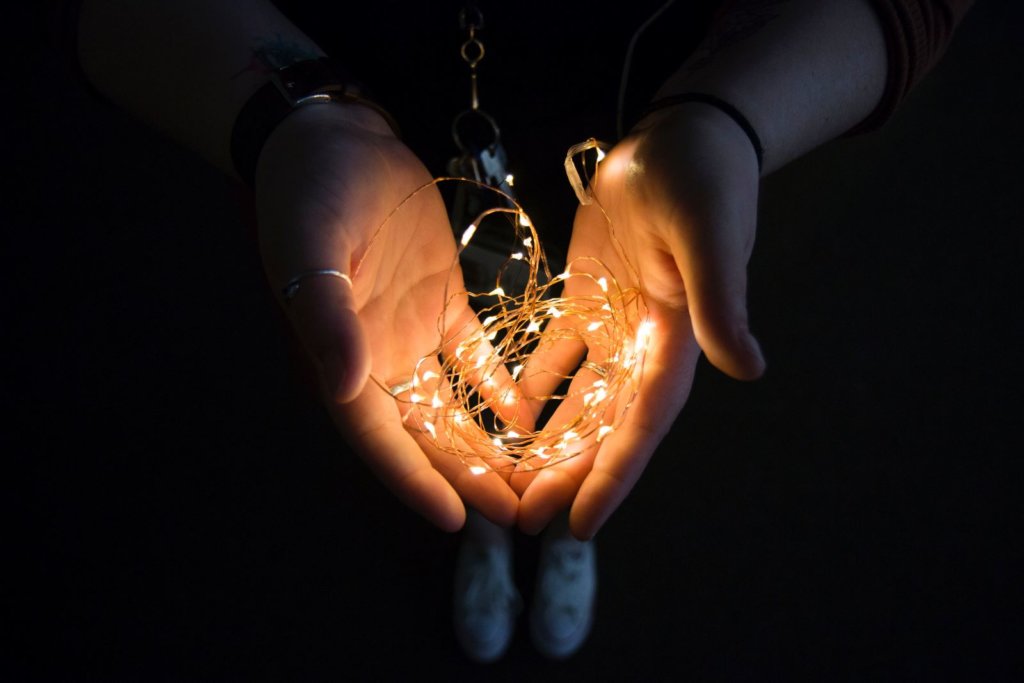
Light is its most potent in the dark. Photo by Chris Moore on Unsplash
Candles are most effective in the dark. Fairy lights are the most appealing when other lights are off. You can’t have lightness and brightness without darkness. There’s a writer I like named Jeff Brown who discusses this. He says:
“Real spirituality is all about ‘enrealment’ – it includes everything human in the equation. The real now is the one that includes everything we left behind on the path. We must work through our story, before the unresolved elements of our story kill us.”
Yes! My spiritual path is about using everything as a vehicle for liberation or enlightenment. About not running from feelings and tough times, and yet always remembering there is something more to me. Something outside the drama, the ups and downs, a witnessing part of me that remains unaffected and emits a light that can never be diminished. It’s my goal to keep growing that light, to keep remembering its presence, and to kindle that light in others.
We each have a light within us that is longing to burn ever brighter, to radiate within ourselves and those around us. In this holiday season, may you also remember the light being that you are. May you remember you are more than the sum of your parts, and may you also endeavor to shine a light on all parts of yourself.
The more you and I can do that, the more we can create a world we wish to see. One where we celebrate with one another, but also mourn with one another because instead of trying to bypass the hard, challenging, shadow parts of ourselves and this world, we acknowledge them. We acknowledge them and we bring light to them, which transforms them.
I dream of a world where we remember our brightness and we share that brightness with others. A world where we’re not scared of shadows because shadows are where light is most needed. A world where we embrace all parts of ourselves as we kindle the flame of “enrealment.” A world where we’re able to be the light.
Another world is not only possible, it’s probable.
Right now it’s Hanukkah, which is a holiday I celebrate because I’m Jewish. There’s a part of me that feels nervous publicly stating I’m Jewish given the current rise of antisemitism. But then I remind myself people already know I’m Jewish. I’ve never hidden that before so why would I start now? And in fact, that’s precisely the story of Hanukkah.
Some people think of Hanukkah as the “Jewish Christmas” because hello, we live in a capitalistic culture so it’s all about the gifts, right? Other people vaguely know Hanukkah as a celebration of oil lasting for eight days. That legend was tacked on later to make Hanukkah seem more miraculous. In actuality, Hanukkah is the celebration of people unifying against oppression and winning.
Judah and the Maccabees revolted against Syrian King Antiochus who enacted a series of harsh decrees against the Jews, including forcing them to give so much of their crops to the Syrian ruling class, the Jews had trouble feeding their families. Jewish worship was forbidden; scrolls were confiscated and burned. Sabbath and the dietary laws were prohibited under penalty of death. The small group of Jewish rebels fought against an army of thousands of men and won. How did they win? According to my rabbi, Michael Lerner, they won in part because they believed there is something about the universe that makes such struggles winnable.
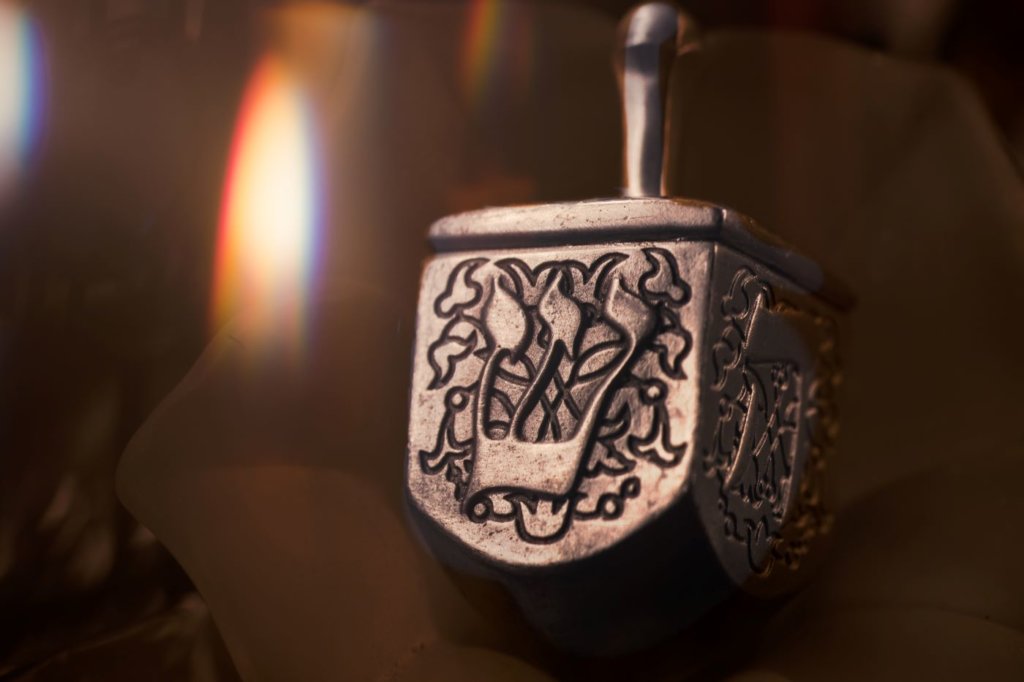
In case you didn’t know, this image shows a dreidel. It’s used in a game Jews play on Hanukkah. Photo by Robert Zunikoff on Unsplash
In a Hanukkah message, he wrote that “something,” that force, is celebrated when we light candles for Hanukkah or when Christians light candles for Christmas.
“Hanukkah is not just about having a response to the consumption craze around Christmas, it is about affirming a different worldview, a hopeful worldview. [It’s] about replacing cultures of domination with a culture of love and justice,” Rabbi Lerner wrote. “[Hanukkah is also about] recognizing that alternative is not yet fully articulated in the Jewish world and needs all of us to make it clearer not only to the larger world, but to our own communities, synagogues, and Jewish organizations.”
This Hanukkah I’m reminded of what it means to be Jewish: to struggle and to overcome. To be a minority fighting for justice. To join other minorities in doing the same. This Hanukkah I’m also reminded we can win. It seems grim or even impossible that we can wrest power from the wealthy elite hellbent on destroying us all for their own gain. It seems daunting to dismantle racism, sexism, homophobia, and other prejudice, but it can be done. A small but mighty few can accomplish just that.
To paraphrase my spiritual teacher, the strength of five good people is more than the united strength of a hundred immoral people. It also echoes the famous Margaret Mead quote: “Never doubt that a small group of thoughtful, committed citizens can change the world; indeed, it’s the only thing that ever has.” Let’s continue to be thoughtful, committed, organized citizens changing the world. Let’s remember battles that seemed unwinnable have been won, and in fact, that’s what Jews across the world are currently celebrating.
I dream of a world where we recognize there is a transformative force in the universe that makes liberation possible. A world where we recognize a small but mighty group of organized people can overthrow authoritarian regimes. A world where we band together, letting our collective light shine and say “no” to the people who try to keep us down.
Another world is not only possible, it’s probable.
I’m spending time with my family right now so I’m editing/recycling some old posts of mine.
Right now it’s Christmas and Hanukkah, which I love. In times like these, I think we need to be reminded of what unites us instead of divides us.
Maybe it’s because I’m Jewish, but to me, Jesus seems like a mythical figure on the order of Zeus or Apollo. He lived so long ago that sometimes I take for granted he actually existed. He was born, he bled, he defecated. Jesus was a human being. Yes, an amazing human being, but he still existed, was still blood and bones the same as you and I, which astounds me. Fun fact, Sir Isaac Newton was also born on December 25. Newton wasn’t Jesus, but he was still a remarkable guy.
Why am I mentioning Newton’s birth? Primarily because when I hear about incredible human beings like Jesus, Newton, Albert Einstein, or Martin Luther King Jr., I somehow put them above me. I think to myself, “Those were amazing human beings, but I could never do anything like they did. I could never accomplish what they did.” I somehow don’t believe they felt the things I felt or struggled the way I struggled. But that’s not true. They were people just like us. They had fears and failures just like us. Nothing separates us.
We’re all made of the same material. We all come from the same source. We are all light, which brings me to Hanukkah. One of the principles of the holiday I like the most is that one candle may kindle the light of many others and yet lose none of its own light. Right now I think it’s important to remember great people of the past, to remember we are like them, may accomplish what they’ve accomplished, and also we can be candles in the dark that kindle the light of many others.
My spiritual path is about using everything as a vehicle for liberation or enlightenment. About not running from feelings and tough times, and yet always remembering there is something more to me. Something outside the drama, the ups and downs, a witnessing part of me that remains unaffected and emits a light that can never be diminished. It’s my job to keep growing that light, to keep remembering its presence, and to kindle that light in others.
We need to keep kindling that light in others so we create a world we wish to see. A world where we live amongst each other in harmony. A world where we celebrate with each other and mourn with each other. A world where we aspire to great heights, accomplishing what we burn to accomplish like people in the past. A world where we remember who we really are — light beings.
Another world is not only possible, it’s probable.
